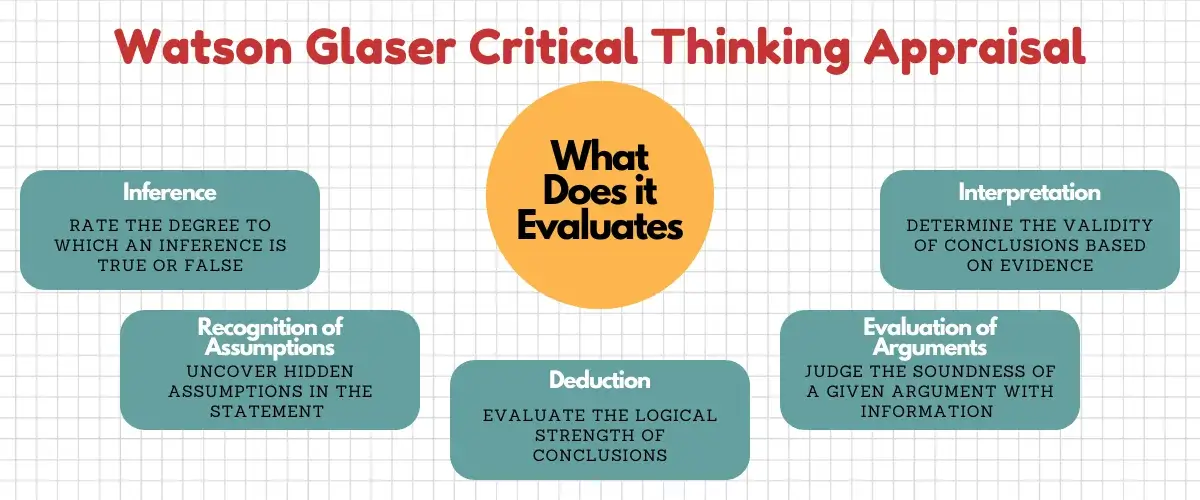Free Watson Glaser Practice Test - Practice & Prepare for the WGCTA in 2025
- Overview
- Practice Test
- Curriculum
- FAQs
- Reviews
Watson Glaser Critical Thinking Appraisal (WGCTA) is one of the premier critical thinking tests. Widely used across various industries, this test is well-suited to both academic and professional contexts, from college admissions to law firms. Originally developed by Goodwin Watson and Edward Maynard Glaser, it evaluates your critical thinking abilities through five key sections: Inference, Recognition of Assumptions, Deduction, Interpretation, and Evaluation of Arguments.
Renowned for its challenging nature, the WGCTA is notorious for thwarting the dreams of many unprepared candidates. To make sure that’s not you, we have made a Watson Glaser prep course including dedicated practice tests for each test section which simulate the complex test format. Ready to gauge your current level? Let’s get cracking!


Watson-Glaser Critical Thinking Course
Last Updated: Jan 24, 2025
Course Content
-
 Introduction 2 StepsBuy this Course: Get full access to all lessons, practice tests and guides.
Introduction 2 StepsBuy this Course: Get full access to all lessons, practice tests and guides. -
 Inference 2 StepsBuy this Course: Get full access to all lessons, practice tests and guides.
Inference 2 StepsBuy this Course: Get full access to all lessons, practice tests and guides. -
 Recognize Assumptions 2 StepsBuy this Course: Get full access to all lessons, practice tests and guides.
Recognize Assumptions 2 StepsBuy this Course: Get full access to all lessons, practice tests and guides. -
 Deduction 2 StepsBuy this Course: Get full access to all lessons, practice tests and guides.
Deduction 2 StepsBuy this Course: Get full access to all lessons, practice tests and guides. -
 Interpretation 2 StepsBuy this Course: Get full access to all lessons, practice tests and guides.
Interpretation 2 StepsBuy this Course: Get full access to all lessons, practice tests and guides. -
 Evaluate Arguments 2 StepsBuy this Course: Get full access to all lessons, practice tests and guides.
Evaluate Arguments 2 StepsBuy this Course: Get full access to all lessons, practice tests and guides. -
 Full Size Practice Quiz - Untimed 1 StepBuy this Course: Get full access to all lessons, practice tests and guides.
Full Size Practice Quiz - Untimed 1 StepBuy this Course: Get full access to all lessons, practice tests and guides. -
 Full Size Practice Quiz - Timed 1 StepBuy this Course: Get full access to all lessons, practice tests and guides.
Full Size Practice Quiz - Timed 1 StepBuy this Course: Get full access to all lessons, practice tests and guides.
Watson Glaser Free Practice
Free Watson Glaser Practice Test
15 Questions - 5 Minutes
This quiz matches the difficulty of the real Watson Glaser test, and our comprehensive prep course also prepares you at the same level to ensure your success.
Success Stories
4.8 813 Reviews
rob, 16 Jan
Solid review course that covers the…
Solid review course that covers the relevant topics in good detail
chad, 11 Jan
Great Program, amazing practice simulations
Easy to understand. Passed tests on first time thru.
QUEEN RIGHTEOUS, 07 Jan
Highly recommended.Great instructional…
Highly recommended.Great instructional information. I passed on the first try.
MasterCommand, 14 Nov
Prepterminal. Prepare, practice, execute.
To say that Prepterminal helped me prepare and be ready for the testing phase would be an understatement. At first, looking at the course, I felt overwhelmed with the course material, but the course broke down each subject effectively which made it easier to understand. There were a few issues with some of the audio portion of the testing course, but beyond that, the course was well worth the money.
Abazix LLC, 09 Nov
Would recommend
Study material helped to pass my test on the first try.
Natalia M. Delgado, 08 Nov
Exelent course 100% guaranteed
Exelent course 100% guaranteed
How is the Watson Glaser Test Scored?
A candidate’s score on the Watson Glaser test is evaluated against a norm group. Potential employers use this comparison to assess all applicants, with those achieving the highest relative scores likely progressing to the next stage of the hiring process.
Excelling on the Watson Glaser test requires outperforming competitors, as merely doing well may not be sufficient to stand out. A good score varies by company, but aiming for at least 80% generally positions a candidate favorably.
The Watson Glaser test uses the RED Method—Recognize Assumptions, Evaluate Arguments, and Draw Conclusions—which is crucial for demonstrating critical thinking skills.

Created by: Michael Learner
Psychometric Tutor, Prepterminal Test Expert
6876 students, 4.8, 813 Reviews
Hey, I’m Michael, PrepTerminal’s Watson Glaser expert. I am here to help you with any questions or concerns you may have about the Watson Glaser Critical Thinking Appraisal – WGCTA. Feel free to contact me at [email protected].
FAQs
The Watson Glaser test typically takes about 30-40 minutes to complete, depending on the specific version of the test.
A good score on the Watson Glaser test varies depending on the employer and the industry. However, candidates should aim to score at least 80% to be considered a strong candidate.
Policies on retaking the Watson Glaser test vary by employer. Some may allow a retake after a certain period, while others may not. It’s best to check with the specific organization you are applying to.
You can use our practice tests as many times as you want throughout your course duration. We have no limit on the usage of our practice tests.
The preparation time for the Watson Glaser test varies for each applicant. Some may be ready within a week, while others might need more time. To accommodate different needs, we offer three course durations: 1-week, 1-month, and 3-month access. This allows you to practice comfortably at your own pace.
